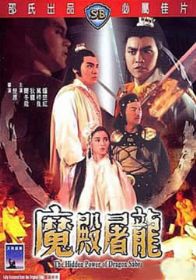| The Hidden Power of the Dragon Sabre | |||||||
|---|---|---|---|---|---|---|---|
 DVD cover art | |||||||
| Chinese name | |||||||
| Traditional Chinese | 魔殿屠龍 | ||||||
| Simplified Chinese | 魔殿屠龙 | ||||||
| |||||||
| Directed by | Chor Yuen | ||||||
| Written by | Shaw Creative Group | ||||||
| Produced by | Mona Fong | ||||||
| Starring | Derek Yee Ti Lung Alex Man Cherie Chung Leanne Liu | ||||||
| Cinematography | Lam Chiu | ||||||
| Edited by | Siu Fung Ma Chung-yiu Chiu Cheuk-man | ||||||
| Music by | Stephen Shing So Jan-hau | ||||||
Production company | |||||||
| Distributed by | Shaw Brothers Studio | ||||||
Release date |
| ||||||
Running time | 87 minutes | ||||||
| Country | Hong Kong | ||||||
| Languages | Cantonese Mandarin | ||||||
| Box office | HK$652,164.00 | ||||||
The Hidden Power of the Dragon Sabre is a 1984 Hong Kong wuxia film directed by Chor Yuen and produced by the Shaw Brothers Studio. The film is a spinoff of Louis Cha's novel The Heaven Sword and Dragon Saber .